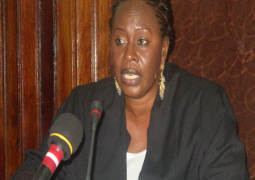Recent data released by the Monetary Policy Committee of the Central Bank of the Gambia indicated a revised growth projection of 6.5 percent for the Gambian economy in 2008, down from 6.9 in 2007. This is premised on the decreased activity in building and construction and groundnut trade.
Available data also indicates that government budget, including grants, registered a surplus of 0.1 percent of GDP in 2007, whereas excluding grants translated to a budget deficit of 1.0 percent of GDP.
At a press conference held at the Central Bank last Friday, Mr. Bamba Saho, Governor of the Central Bank of the Gambia, revealed that in the year to end- January 2008, growth in money supply decelerated to 3.9 percent from 22.6 percent in 2007.
'Quasi money grew by 11.2 percent whilst narrow money contracted by 2.3 percent. Reserve money grew by a minuscule 0.1 percent compared to 12.8 percent a year earlier," he elucidated.
Total revenue and grants, he went on, increased to D3.6 billion in 2007, or 16.8 percent from 2006. 'Domestic revenue comprising tax and non-tax revenue rose by 13.7 percent to D3.4 billion and was D106.1 million higher than the budget estimate of D3.3 billion."
According to Governor Saho, the inter-bank foreign exchange market continues to be vibrant. 'The volume of transactions in the inter-bank market, measured by aggregate purchase and sales of foreign currency, increased to US$1.7 billion compared to US$1.2 billion in 2006."
'The banking sector remains sound and profitable. The industry risk-weighted capital adequacy ratio was 23.9 percent in December 2007, over and above the required minimum of 8.0 percent" he observed.
The Central Bank Governor went on to reveal that headline inflation, measured by the National Consumer Price Index, rose from 2.0 percent in January 2007 to 5.1 percent at end-January 2008. This however compared to end-December 2007, consumer price inflation decelerated by 0.9 percent.
"Food price inflation was 8.4 percent in January 2008 compared to 2.1 percent a year earlier. Non-food inflation also rose, albeit by about half a percentage point, to 1.4 percent. Core inflation, which excludes prices of energy and volatile food items, accelerated slightly from 3.4 percent in January 2007 to 4.2 percent at end-January 2008," Governor Saho noted.
The outlook for inflation, he noted, is influenced not only by domestic factors but international developments as well. "Mirroring the moderate growth in the monetary aggregates as well as the strengthening of the Dalasi and low inflationary expectations, inflation is forecast at about 5.0 percent at end-December 2008."
There are however upside risks to the inflation outlook relating primarily to the continued increase in global and commodity prices and the outcome of the 2008 budget, Governor Saho noted.
In conclusion, The Central Bank Governor reaffirmed the Monetary Policy Committee's resolve to continue to monitor changes in economic conditions and respond appropriately in order to discharge its mandate to maintain price stability.
Read Other Articles In Article (Archive)
Why Football Veterans Should Play A Part in Football Development
Jan 20, 2009, 5:22 AM


